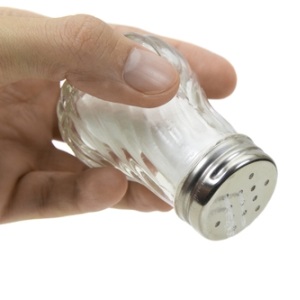
We’re constantly being told that too much salt is bad for us and that we need to limit our salt intake. The medical establishment tells us that salt raises our blood pressure, which can lead to strokes, heart failure and heart attacks, one of the leading causes of death and disability in “developed” nations.
'Salt sensitive'
Nowadays salt is added to many foods, and we undoubtedly consume much more salt than our ancestors. At one stage salt was “worth its weight in gold” and Roman soldiers were paid in salt – hence the word “salary” (sal = salt in Latin).
High salt consumption is further traditionally linked to osteoporosis, stomach cancer, kidney disease, kidney stones, vascular dementia obesity and water retention. It is also believed to contribute to the symptoms of asthma and diabetes.
According to Health24’s DietDoc, “Certain populations are what is called ‘salt sensitive’ and react to high salt intakes by developing dangerously high blood pressure levels.”
Read: Primary hypertension
South Africa has one of the highest hypertension rates in the world and, like African Americans, our black population is what is called “salt sensitive”. (People who are “salt sensitive” react more negatively to high amounts of salt in the diet and it has more damaging effects on their health.)
The World Health Organisation recommends a daily salt intake of four to six grams of salt per day, and the mean sodium intake in South Africa is 7g per day – which has led the South African Department of Health to consider legislation to lower the salt content of our food.
Too little sodium is even worse!
However, a 2011 JAMA study indicated that a when there is too little salt in the diet, stroke, heart attack and death are more likely than when there is too much sodium in the diet.
Also, a 2012 study in the American Journal of Hypertension found that low salt diets contribute to an increase in hormones and lipids in the blood. The conclusion of the authors was the small reduction in blood pressure as a result of lowered sodium consumption was counteracted by the higher plasma levels of rennin, cholesterol and triglycerides, and that strongly reduced sodium levels may actually have negative effects on the population at large.
It seems almost impossible to maintain an optimal sodium level at all times, so how do we manage to stay healthy?
Debunking the myth
Science writer and author of Why we get Fat (2011), Gary Taubes explained more than ten years ago: “The data supporting universal salt reduction have never been compelling, nor has it ever been demonstrated that such a program would not have unforeseen negative side effects.”
Read: Reducing salt does little good
There have also been other studies that failed to prove that increased salt intake causes elevated blood pressure, and there is increasing consensus that salt restriction poses more health risks than high salt intake.
Potassium to the rescue
Is it possible that high blood pressure and heart disease are not caused by too much salt, but by an imbalance in our diets between sodium and potassium?
A recent four-year long observational study (the Prospective Urban Rural Epidemiology [PURE] study) found that while higher sodium levels correlate with an increased risk for high blood pressure, potassium helps offset sodium’s adverse effects.
The authors of the study indicate that it would be a better strategy to concentrate less on sodium restriction and focus more on higher levels of potassium in the diet to counteract the hypertensive effects of sodium. (A diet high in processed foods is notoriously high in sodium and low in potassium.)
Our bodies need potassium to maintain the correct pH levels and to regulate blood pressure, and according to the PURE study, potassium deficiency may actually be more responsible for hypertension than excess sodium.
Potassium deficiency is called hypokalemia and symptoms include water retention, hypertension, arrhythmias, muscle cramps and constipation.
How to achieve a good sodium-to-potassium ratio
To make sure you obtain the correct ratio of salt and potassium, you need to:
- Avoid all processed foods.
- Eat whole, unprocessed foods to increase your potassium intake.
- Avoid commercial salt and rather go for natural salts that contain less sodium and more potassium.
Good dietary sources of potassium include:
- Avocados
- Papayas
- Spanspek
- Bananas
- Broccoli
- Brussels sprouts
- Pumpkin
How much potassium do we need?
People 14 years and older need a daily potassium intake of 4,700 mg. White beans contain 561mg per 100g, baked potatoes 535mg and bananas 358mg. You would therefore need to eat approximately 13 bananas or nine baked potatoes to get your daily potassium quota.
Read more:
Eating too little salt may also be bad
Too little and too much salt – both are dangerous
Image: Salt shaker from Shutterstock




 Publications
Publications
 Partners
Partners











